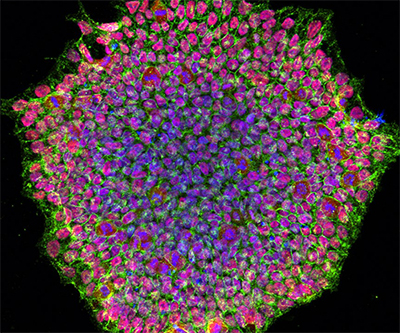
A colony of human induced pluripotent stem cells.
Credit: National Eye Institute, NIH
Thanks to their ability to develop into any specialized cell type, pluripotent stem cells offer enormous promise for regenerative medicine. However, the risk that pluripotent stem cells may develop into tumors poses an obstacle to the use of therapies based on these cells and their progeny.
Previously, the DePamphilis Lab identified a family of small molecules called PIKfyve inhibitors that can selectively kill cancer cells. These inhibitors disrupt the stable equilibrium that is essential for degrading and recycling cellular components to provide energy and nutrients for cell growth and proliferation.
In a recent study, the researchers found that PIKfyve inhibitors can selectively kill pluripotent stem cells, including embryonic stem cells (ESCs), induced pluripotent stem cells, and embryonal carcinoma cells (ECCs)—the malignant counterparts of ESCs. The inhibitors did not kill normal or non-malignant cells that originated from the pluripotent stem cells.
The scientists further confirmed the ability of PIKFyve inhibitors to selectively kill pluripotent cancer cells in a preclinical study with mice. Treating mice bearing teratocarcinomas with a PIKfyve inhibitor slowed tumor growth and eliminated ECCs, converting a rapidly growing cancerous tumor into a slow-growing benign tumor.
The findings indicate the potential of PIKfyve inhibitors to kill pluripotent cancer cells and eliminate tumors that may arise from the therapeutic use of pluripotent stem cells.
 BACK TO TOP
BACK TO TOP